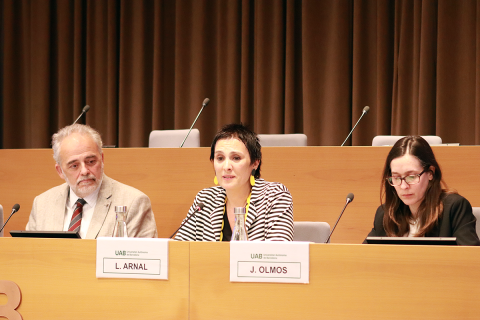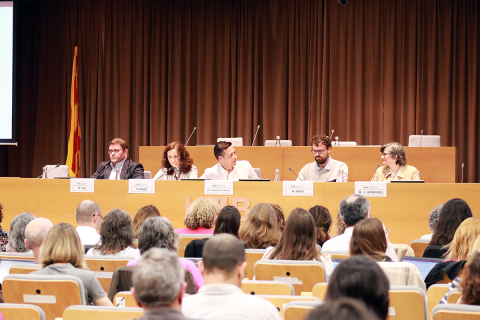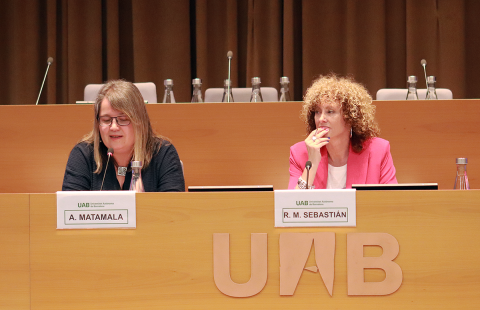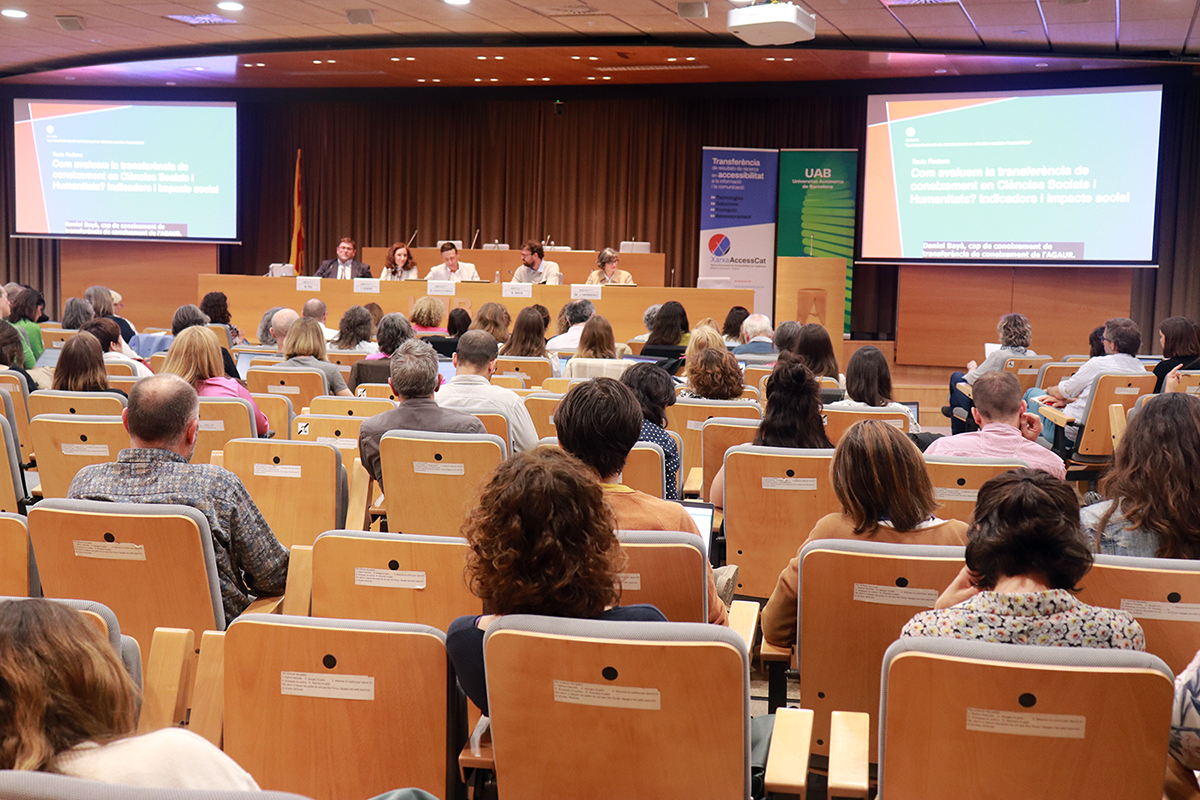The conference, held on May 9, sparked many debates in the field of Social Science and Humanities transfer, a field that must still define what we can consider transfer and which mechanisms may be used to evaluate its impact.
What do we mean when we talk about knowledge transfer in Social Science and Humanities? How can we evaluate knowledge transfer in this sector? These questions were the central issues discussed during the conference “Knowledge Transfer in Social Science and the Humanities”, which has held on May 9 at the rectorate of the Autonomous University of Barcelona.
The conference brought together over 200 attendees, ranging from researchers to transfer technicians and authorities from universities and public administrations. Thanks to this high attendance, many essential discussions took place in order to make progress in valorisation and knowledge transfer in Social Science and Humanities.
The day began with an institutional welcome speech given by Laia Arnal, director general of Transfer and Society of Knowledge of the Government of Catalonia, and Javier Lafuente, rector of the UAB.
From these two dialogues, we would like to underscore a couple of reflections. Firstly, “When we speak of transfer, we are speaking of transforming knowledge into social value, into solutions that answer our needs,” from Laia Arnal. Secondly, we would like to highlight Javier Lafuente’s defence of the essential role Social Science and Humanities plays in making progress to benefit society. At the same time, he reminded us of the transversality of transfer, which is not only limited to science and technology.

Next was a lecture by Julia Olmos, professor in Business Organisation and member of INN4ALL, research group in Innovation, Science and Society at the University of Valencia. Many reflections were brought to light during her lecture, such as “when transfer and commercialisation are put on the same level, certain disciplines do not feel included”, or the image of the social valorisation of knowledge iceberg for Social Science and Humanities [In Catalan].

Finally, the conference concluded with two round tables. The first one, "What Do We Mean When When We Talk About Knowledge Transfer in Social Science and Humanities?”, offered us reflections such as:
- At the AccessCat Network, “we’ve trained members in how to transfer research results. We’ve learned business terms such as ‘spin-off’ and ‘licence’, which have been very useful. But we’ve also realised that we perform many transfer activities that are not seen”, from Anna Matamala, lead researcher at TransMedia Catalonia (UAB) and director of the AccessCat Network.
- Jordi Batlló, director of the Department of Communication (UPF), shared the transfer page from the Pompeu Fabra University, whose design and approach illustrate the diversity and wide scope of transfer.
- “In Social Science, we must co-construct transfer together with society. We have been doing this for many years. We must contextualise and recontextualise what we do. We always need co-construction of knowledge […]. In Social Science, we have the opportunity to play a major role in social impact and to achieve very high numbers. Social impact numbers”, Jordi Collet, professor in Sociology of Education (UVic-UCC), explained.
- “Experimental sciences usually do quantitative research and social sciences do qualitative research […]. We must put an issue on the table: in order to transfer, you either find a company or look to other agents. However, many of these agents don’t believe in academia”, Laura Sáez, member and co-CEO of CoRegistros, S.L.U. and lecturer at the UB and the IQS, explained.

Some reflections from the second round table, which focused on evaluation, indicators, and social impact:
- “People always say that something must be measured in order to understand it, but I think that, actually, first you must understand something in order to measure it. Metrics don’t capture everything we do. We need quantitative and qualitative data”, from Marcos Paz, technician in Knowledge Transfer (UOC) and member of the RedOTRI Work Group in Social Science and Humanities Transfer.
- “The way we collect evidence on social impact must be broad. From a multidiscplinary view, qualitative evidence cannot always be quantified. There is also an intangible impact […]. Co-creation is an essential element. Social Science must contribute to developing how social impact must be defined”, from Teresa Sordé, professor of Sociology (UAB).
- “Public administrations must help. Therefore, we must understand what you do in order to know what we must request and which social indicators are useful for Social Science and Humanitites”, from Nadal Bayà, head of the Area of Knowledge Transfer (AGAUR).
- “What isn’t measured doesn’t exist. We need a series of indicators associated to methodologies […]. We realised we needed to change our language in order to talk about transfer in Social Science and Humanities: instead of ‘benefit’, we spoke about ‘sustainability’, and instead of ‘clients’, we spoke about ‘users’”, explained María José Herrero, member of the European project Revalorise and head of Connexió amb l’Ecosistema. Servei de Suport a l’Emprenedoria i la Innovació (UC3M).

The day ended with a closing speech by Anna Matamala, director of the Network, who summarised the conference in 15 points (you can see the director’s conclusions here). Following her, Rosa María Sebastián, vice-rector for Innovation, Transfer and Entrepreneurship at the UAB, reminded attendees of the importance of transforming the day’s debates into actions.

The conference “Knowledge Transfer in Social Science and the Humanities” was an initiative put forth by the AccessCat Network. The conference had the support of the vice-rector for Transfer, Innovation and Entrepreneurship of the UAB and AGAUR, through the Grants for R&D&I Networks (2021XARDI00007), and the collaboration of the UAB Parc de Recerca and the Directorate General of Knowledge Transfer of the Government of Catalonia.
Additional materials for more information on the conference:
- Full recording of the event.
- Visual diagrams summarising the key ideas in the lectures and round tables, created by graphic recorder Ester Pino (Esterytelling).
- Conclusions on the conference, presented by Anna Matamala, director of the Network.
- Slides from Julia Olmos Peñuela’s presentation (linked in the news article).



